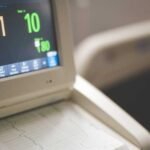
Does Your Heart Suddenly Beat Very Hard? “Premature Ventricular Contraction” Can Lead to Arrhythmia. Adults Should be Careful
“Doctor, I often feel like there is a lump of air stuck in my chest, and it’s a little difficult to breathe. Sometimes my heart beats down, and sometimes it suddenly beats very hard, and my whole body feels dizzy, as if it’s shaking.”
The above is a common situation in patients with early ventricular contraction. Early ventricular contraction can cause arrhythmia, palpitations, and also affect breathing. It is more common in people aged 45 to 65 years old. In this article, we introduce to you what is premature ventricular contraction? What are the symptoms of heart contraction? Will early ventricular contractions be ok, and does it need treatment?
What is “premature ventricular contraction”?
The beating of the heart has a control system. The “sinoatrial node” located above the right atrium is responsible for the control center. It discharges electricity to cause the atrium to contract and pump blood into the ventricle. The signal is then transmitted to the “atrioventricular node” located between the atrium and the ventricle. Another electrical discharge causes the ventricles to contract, pumping blood into the aorta or pulmonary artery. The amount of blood pumped out in this order is enough for the body to fully utilize.
Early ventricular contraction, also known as premature ventricular contraction or premature ventricular contraction, means that the ventricle contracts prematurely and pumps blood before it receives the contraction signal. Therefore, the blood volume is less than normal, resulting in poor heart beating efficiency and easy to feel an empty heartbeat; in other words In other words, the heartbeat is not complete and strong enough, and you may not be able to detect the heartbeat even by checking the pulse.
Early ventricular contraction will cause the diastolic period between heart beats to become longer, and more blood will be injected into the heart. Therefore, the next heartbeat will return to normal, and when the heart beats normally, the amount of blood pumped out will become particularly large, making people feel like their heart is beating. Strong, palpitations, and even body shaking; and a strong heartbeat can also stimulate the vagus nerve near the pulmonary artery, causing difficulty breathing or coughing
Causes of premature ventricular contraction
Early ventricular contraction originates from unstable ventricular potential. The possible reasons for potential instability are as follows:
- Primary
- Substance abuse
- Structural heart disease
- Hereditary heart disease
- Pulmonary hypertension, apnea
- Abnormal thyroid function
- Lifestyle habits or stress that lead to over-excitation of the sympathetic nervous system, such as caffeine intake or staying up late

Will early ventricular contraction be good? Need treatment?
For patients with early ventricular contraction, doctors will use electrocardiogram and cardiac ultrasound to check whether the patient’s heart function is abnormal, and adopt different treatment strategies based on the results and severity of symptoms.
- The heart function is normal and the number of arrhythmias is small.
This type of early ventricular contraction may be caused by abnormal work and rest and excessive stress. By improving life and maintaining a healthy lifestyle, early ventricular contraction can be improved. Here are 6 suggestions:
- Enough rest
- Reduce life stress or release stress moderately, such as exercise, travel, yoga, etc.
- Avoid overexertion
- Avoid getting emotional
- Quit smoking and stay away from second-hand smoke
- Avoid irritating foods such as coffee, tea, and alcohol
- Enough rest
- Normal heart function, frequent arrhythmias
Physicians may prescribe the following three drugs to reduce the incidence of premature ventricular contraction and arrhythmia.
- Beta-blockers: Bisoprolol, Carvedilol
- Calcium ion blockers: Verapamil, Diltiazem
- Antiarrhythmia: Amiodarone, Propafenone
- Beta-blockers: Bisoprolol, Carvedilol
- Abnormal cardiac function, improvement based on the cause
If the heart function is abnormal, doctors will improve the cause, such as treating pulmonary hypertension and thyroid dysfunction. If early ventricular contraction is severe, electrocautery surgery must be considered to avoid damage to cardiac systolic function or even heart failure.
If treated with electrocautery surgery, a 3D three-dimensional arrhythmia positioning system will be used to identify the abnormal discharge area, and an electrocautery catheter will be used to cauterize the abnormal discharge area to make the abnormal discharge disappear and improve early ventricular contraction; the operation time is about 2 to 3 hours, and the treatment The success rate is about 80 to 90%.












